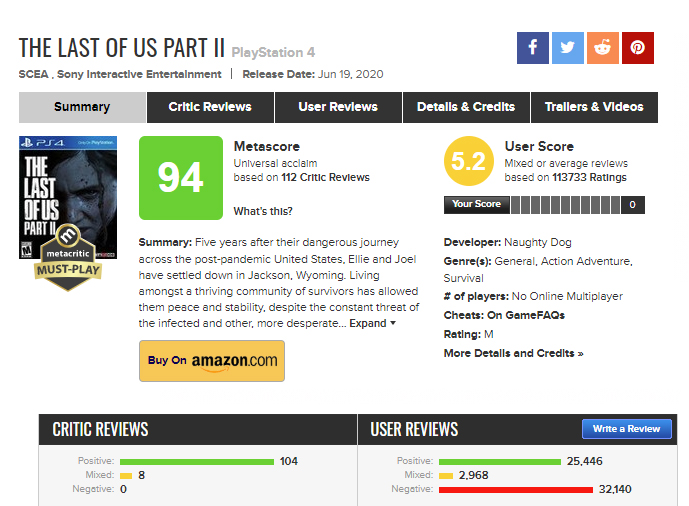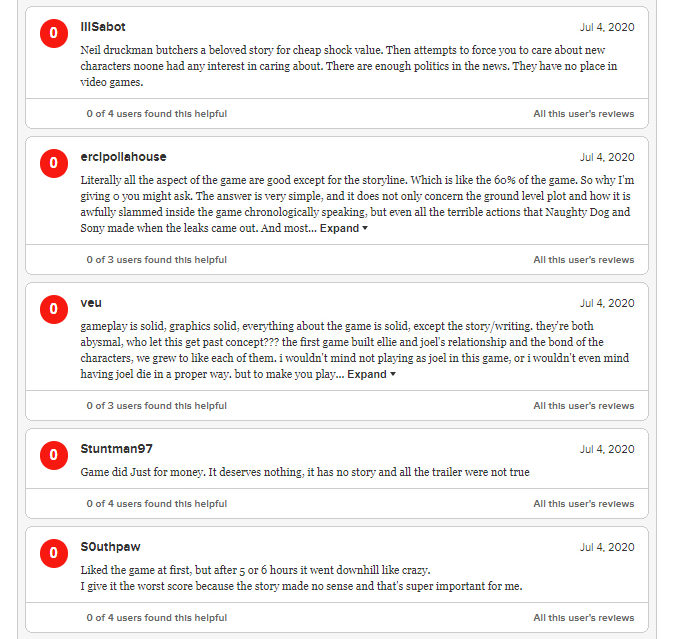I’ve been playing through The Last of Us Part II (TLoU2), a game that has been garnering some insanely high praise. This game is in my mind less than perfect, though it seems like that is an unenviable position to take. I finally got around to entering the conversation, and I found that things have become antagonistic. There are extreme opinions on either side, and a lot of people caught in the middle of TLoU2 discourse warfare.
I’m going to put a warning up now regarding spoilers. To properly dissect the criticisms, it’s important that we give context. I’ll talk in-depth about the game, which means I’m also referencing its predecessor, The Last of Us. As such, there will be spoilers for both games in this article.

The leaks and the anger
In the years leading up to the sequel of The Last of Us, things were generally positive. In trailers, press conferences and the like, fans praised the graphics and animation. These elements were and still are fantastic. The plot is a bit more contentious. Unfortunately, leading up to release, The Last of Us Part II hit a large roadblock that derailed a lot of the game’s good press.
In April of this year with TLoU2 on the horizon, major details regarding the game were leaked. Naughty Dog and Sony scrambled for damage control. Sadly, the tide was turning away from their favour. The game was delayed. The game’s director, Neil Druckmann, implored fans to not seek out the information but his request seemed to fall on deaf ears. People looked into the leaks that spoiled much of the narrative’s twists and turns. Many were not happy.
There was an appreciable shift in the fandom’s reaction when the leaks hit. There were two main plot details that fans railed against: the first notable point was the death of The Last of Us protagonist, Joel. Joel had served as the primary controllable character, and understandably fans were attached to this father figure. So hearing that he had been offed, essentially as character motivation for the sequel’s protagonist, was a blow to many. The gory method of his demise didn’t help either. What also didn’t help is that his killer, Abby, would serve as the second protagonist of sorts featuring in the game’s second half. This was a bit of an insult to injury point to a rather zealous section of the fanbase.
Fans flooded TLoU2’s Metacritic page leaving negative reviews in protest of the game. Sometimes review bombing can be a loud, if usually unsuccessful, way to get a dev’s attention. Sometimes this is for good, like protesting unfair, predatory monetisation models. This is not the case here. User reviews as of writing sit at a 5.2, although this is a steady recovery from an average as low as 3.1. As many journalists noted, a lot of these reviews were very soon after the release date. So soon that a sizeable contingent could not have completed the 20+ hour campaign before decrying its faults.
As an advocate for discussion about games, I’m always ready to talk through the good and bad of our entertainment to improve it. As such, I don’t want to simply call these review bombers mean names. I want to talk about their issues.
Dissecting the rage surrounding The Last of Us Part II
Well ok, there is one issue I’m not giving much time. That’s for homophobia and transphobia.
Tragically, in this day and age, people still seek to bury games that include LGBT characters. Yes, the game that advertised itself with two girls kissing led to some upset people that don’t agree with that representation. Suffice to say, I don’t pay any mind to the “critique” of a game being “SJW”. The assertion that a game with lesbians and transgender people is worthy of ire is childish. No one can fully abstract their beliefs from their reaction to art, but your beliefs shouldn’t completely change the perception of the art. No one is “forcing politics” down people’s throats, so do not use your own political beliefs to reductively criticise this game. It’s fine if you don’t like it, just don’t drag anything through the mud for refusing to align with your personal beliefs and values.

To move onto a more sensible point of critique, let’s look at the claim that the TLoU2 writers “betrayed” fans and Joel. Joel, the protagonist of the original Last of Us, is killed off about 2 hours in. Many fans thought he would keep holding the protagonist position throughout. It’s an odd duck of a criticism; throughout all the marketing, Ellie has been front and centre. I understand people are attached, but this is a zombie apocalypse setting, infamous for killing off anyone at a moment’s notice. So surely this is par for the course?
Does a game have a right to dangle a character that we love in front of us to just snatch them away? This is by no means a new idea in media. If two gay characters get together, there’s a reasonable chance that one or both of them die. It’s even got a codified name in “Bury Your Gays”. I’d be lying if I didn’t think the advertised lesbian couple would fall apart due to this trope. If media kills off gays, or people of colour, or women, why not the protagonist of a previous game?
For a perfect example of how this type of narrative drive can be used effectively, look no further than the original The Last of Us. What is the most emotionally impactful moment of the game? How does the story brutally bring you to understand the terror of this apocalyptic world? It’s Sarah, Joel’s daughter dying in his arms. An innocent character caught up in the violence of this world. We only get to know Sarah for a short time, but it’s still long enough to feel the horror of losing her and to give context for the guilt Joel feels going forward. Maybe because we spend so much more time with Joel, it feels less justified to kill him off? For some this may be the case, for others that may just be an excuse. In many ways, this feels like veiled misogyny – there is a double standard with character deaths.
Secondly, there is the anger at being forced to play half the game as Abby. Sure, Abby is positioned as the antagonist. If you’re committed to the idea that she is evil, being forced to walk through half the game in her shoes is a very awful thought indeed. I don’t hate the decision; I got used to it. I’ve landed on a relative indifference, that in the grand scheme of things I can recognise as a good narrative choice. But in a game that felt like an emotionally draining venture, it didn’t help.
All things considered, the critical arguments of review bombers don’t really hold up. Yes, some people hated the game for the fact that it included lesbians. I’m not going to try and engage with those people intellectually or critically. Other issues regarding Joel and Abby make more sense in the context of the game, though that is part of the problem. By seeing the story without any details, it’s easy to dismiss it. Many of these people are likely part of this contingent that used Metacritic as a platform to “protest” the game.
It’s sad because the discourse has been fractured around this. There is an obvious rift between these two narratives. A large – or at least loud – section of the audience hate this game for bigoted reasons. Unfortunately, running this logic in reverse allows fans to dismiss and assign moral or intellectual failure to anybody that dislikes the game.
Developers and critics: where is the line?
People have been praising the Last of Us Part II left and right. Even our own review has given this game a 10/10 score, labelling it a masterpiece. I don’t personally see it as such, but that’s the beauty of subjectivity. It can be easy to forget that reviews are, as much as some people deny, completely subjective. Metacritic scores and 10/10s add a layer of statistics to things, sometimes giving the impression that these numbers represent some objective merit to the game. They don’t. No single review holds the “correct” conclusions. There is no right or wrong with disagreeing with this game’s reception.
The line between game development and criticism can be a bit fuzzy at times. I’m a game audio dev and a critic myself, which at times has put me on edge wondering if I can truly be both. As part of a gaming podcast, would it be wrong to promote my own game when it releases? I’d never review my own game, but is it ethical to give codes to my peers? Should I tell them I’m involved, or would that sway their opinions? There are many moral quandaries with no real answer. But as someone who must consider these factors daily, I feel that those associated with TLoU2 have crossed a line.
In regards to TLoU2 being compared to Schindler’s List
In a Twitter thread by game reviewer Jeff Cannata, The Last of Us Part II was described as such:
“In a medium where everything is John Wick, The Last of Us Part 2 is Schindler’s List. And just like that film, there were times when I wasn’t sure I could keep going. It is a relentless emotional assault that I suspect will force even the most jaded gamer to feel empathy.”
Now, many people consider games as an artform, myself included, but this is kind of ridiculous. Point one, every game isn’t John Wick. Animal Crossing is a calm Ghibli-like adventure focussed around friendship. Resident Evil 3 is a schlocky horror action experience. The Last of Us Part II is a revenge-fueled action plot… which come to think of it, almost sounds like John Wick! Do you want to claim games as art? Great. Don’t start by reductively contending that all games are the same.
Additionally, it just isn’t helpful to compare mediums this way. Film has advantages that games don’t. This game has lots of cutscenes, and as such it could be described as “cinematic”, but that isn’t always a positive when it comes to games. Interaction elevates the engagement with the narrative. In fact, this game forcing you to play as the “enemy” pushes you to reconcile your hatred. That is a great use of interaction.
“It is not the critic who counts”: What TLoU2 & Troy Baker say about art and its critics
Perhaps the biggest overstep was done by Joel’s voice actor, Troy Baker. This was his reply to Jason Schreier saying video games were too long (later confirmed to be inspired by TLoU2):
I’ll just leave this here… https://t.co/7yj0XpeOE7 pic.twitter.com/nWYWYSmmhC
— Troy Baker (@TroyBakerVA) June 28, 2020
Theodore Roosevelt did not say these words because he thought art is always great and critics are big meanies. This quote should be a powerful shield against self-doubt in the face of those who would tear you down, but here it’s been used as a battering ram. Rather than disagreeing with one comment, this is a major voice actor attacking any criticism of video games. This is outrageous, right?
In all forms of criticism, there is a contingent that maintains that critics are parasites. Artists hate that someone can come along and besmirch what they have made. Sure, without art, there would be no art critics. But the antagonism against those that speak about it is ridiculous. Critics are bullied, harassed, receive death threats and the like. Of course, this is not reserved just for games media. Hell, when the leaks hit, Druckmann received death threats over the spoiled game content. That might, according to some, entitle them to hit back. To, ironically enough, seek revenge against those that have wronged them.
Having said that, let’s not ignore that Druckmann and his ilk are responsible for bad behaviour in the industry. Naughty Dog put their staff under crunch. In this game that criticises violence, Druckmann bragged about the extent of realism in their portrayal of violence. This likely means that people have to be watching murders and looking at pictures of corpses. So not only are workers under pressure for the work they are doing, the work itself could well be having negative psychological impacts on them. Keep in mind, of course, that this would not be a talking point were it not for critics and journalists uncovering these uncomfortable truths. We can say that we’d be better off without games media, but without that, we’d have to take companies for their word. As such, no one would report on crunch and this practice would continue as intended.
“The sad thing is that this anger is pervasive and shouldn’t be used as a weapon… It is irresponsible.”
There is a visceral sense of anger or resentment when something you love doesn’t get the love you think it deserves. You think about how a higher score would be more deserving. I know this pain, as do all gamers, when your favourite doesn’t get all you want it to. But the demand, the forcing of critics to bend to your will, is a disgusting, cowardly thing.
The sad thing is that this anger is pervasive and shouldn’t be used as a weapon. I don’t want to lay excessive blame at the feet of Troy Baker. He wants to defend his art? Fine. However, it’s hard to deny that he has, regardless of intentions, led a legion of angry fans to a critic’s doorstep. It is irresponsible. Yet, it feels like developers are stoking the fires these days, or at least stepping back from any conversation. It’s upsetting with all the news about the horrible things that happen behind closed doors in the gaming community, that some things that are done out in the light of day get no air time.
So where does that leave us?
I don’t love The Last of Us Part II, but I’ve learned to appreciate elements. Many consider it to be misery porn, and I see why. It’s a game that stretches out traversing through a city. Each new checkpoint is a new tragedy to behold. It’s hard to maintain motivation to continue sometimes, and it makes it all the more gruelling. But for all the work involved, there is a heartbreakingly frank discussion of the cycle of anger and violence.
There’s a bitter irony in this whole story, isn’t there? TLoU2 is a beacon of anger and frustration, over something as comparatively trivial as a video game. Just as Ellie did, legions of fans have seen their hero laid out before them. They have felt attacked, and feel the need to lash out against those that have orchestrated this crime. Hell, there have even been campaigns by such groups to attack Abby, or more specifically Laura Bailey, who voices her. Not unlike Ellie, these people are not going to achieve satisfaction. Despite protests and signatures on their “change TLoU2 for us” petitions, things are not going to change, and any perceived wounds will not heal. I hope the truly extreme of opinion can reach peace soon.
“[This game] is a heartbreakingly frank discussion of the cycle of anger and violence. There’s a bitter irony in this whole story, isn’t there? The Last of Us Part II is a beacon of anger and frustration, over something as comparatively trivial as a video game.”
The developers and talent of this game can be more likened with Abby. They both have made choices that seem right to them. They’re allowed to be angry, to be upset. I can understand the devs wanting to abandon their assigned post to get involved. But when they are getting angry over minor offences, minor criticisms, it is inappropriate. As much as they may consider themselves “The man in the arena”, they aren’t. They’re workers associated with a multi-million dollar project. They are people not risking themselves financially or psychologically. As such they should not be attacking others. Keep in mind, they have a degree of control over things. They can blacklist reviewers that don’t treat them favourably. Not all reviewers, or outlets, have enough of a safety net to risk this.
And we, everyone else, are just the NPCs caught in the crossfire of discourse. Be you critic or gamer, it’s an exhausting world these days, filled with disease, anger, resentment, and at times politicisation over mundane things. Moreso than any other year it feels like the world is ending. So, seeing a game turning into this extreme false dichotomy is a bit hard to swallow.
It’s tiring, seeing so much anger directed at one another. Everything seems so divided. Perhaps the fact that all of what we seem to have at the moment is online makes this worse. My hope, as naïve and idealistic as it may be, is that we can see the problem now. That we understand the mechanisms that drive this anger and resentment so we can dismantle it. That we can stop it. That we don’t return to our lives so broken that we can’t create good things. In that way, perhaps, like it or not, The Last of Us Part II is something we need right now.





